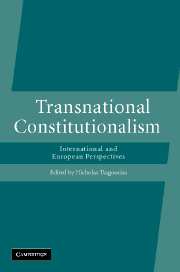Book contents
- Frontmatter
- Contents
- List of contributors
- Foreword by Malcolm D. Evans
- List of abbreviations
- Introduction – Constitutionalism: a theoretical roadmap
- Part I States, courts and constitutional principles
- Part II Transnational constitutional interface
- 5 Hierarchy in organisations: regional bodies and the united nations
- 6 The multilevel constitution of European foreign relations
- 7 Self-determination of peoples and transnational regimes: a foundational principle of global governance
- 8 Challenges to international and European corporatism presented by deliberative trends in governance
- Part III Visions of international constitutionalism
- Index
5 - Hierarchy in organisations: regional bodies and the united nations
Published online by Cambridge University Press: 01 July 2009
- Frontmatter
- Contents
- List of contributors
- Foreword by Malcolm D. Evans
- List of abbreviations
- Introduction – Constitutionalism: a theoretical roadmap
- Part I States, courts and constitutional principles
- Part II Transnational constitutional interface
- 5 Hierarchy in organisations: regional bodies and the united nations
- 6 The multilevel constitution of European foreign relations
- 7 Self-determination of peoples and transnational regimes: a foundational principle of global governance
- 8 Challenges to international and European corporatism presented by deliberative trends in governance
- Part III Visions of international constitutionalism
- Index
Summary
Introduction
Since the inception of the United Nations, there has been a considerable tension between universalism and regionalism, especially in the field of collective security. Debates at the San Francisco conference of 1945 that led to the adoption of the UN Charter showed that even close allies, the United States of America and the United Kingdom, disagreed on the level of autonomy for regional organisations within the new institutional and normative universal framework. Subsequently, debates about the hierarchy between the two levels of international organisations have tended to focus on three key provisions of the UN Charter. At the insistence of regional organisations, Article 51 preserves the right of individual and collective self-defence, until the Security Council has taken the necessary measures to restore peace and security. Such autonomy in regional defensive matters is balanced by the apparent lack of autonomy in offensive action, in that Article 53 of the UN Charter requires that enforcement action by regional bodies has to be authorised by the UN Security Council. In practice, a great deal of debate has surrounded the interpretation of Article 53, concerning, for instance, issues of implicit authorisation, acquiescence amounting to authorisation, and retrospective authorisation, as well as the meaning of enforcement action. Further debate focuses on Article 103 of the UN Charter, which provides that obligations of member states under the UN Charter prevail over obligations arising under any other treaties (implicitly including treaties establishing regional organisations).
- Type
- Chapter
- Information
- Transnational ConstitutionalismInternational and European Perspectives, pp. 135 - 159Publisher: Cambridge University PressPrint publication year: 2007
- 2
- Cited by



